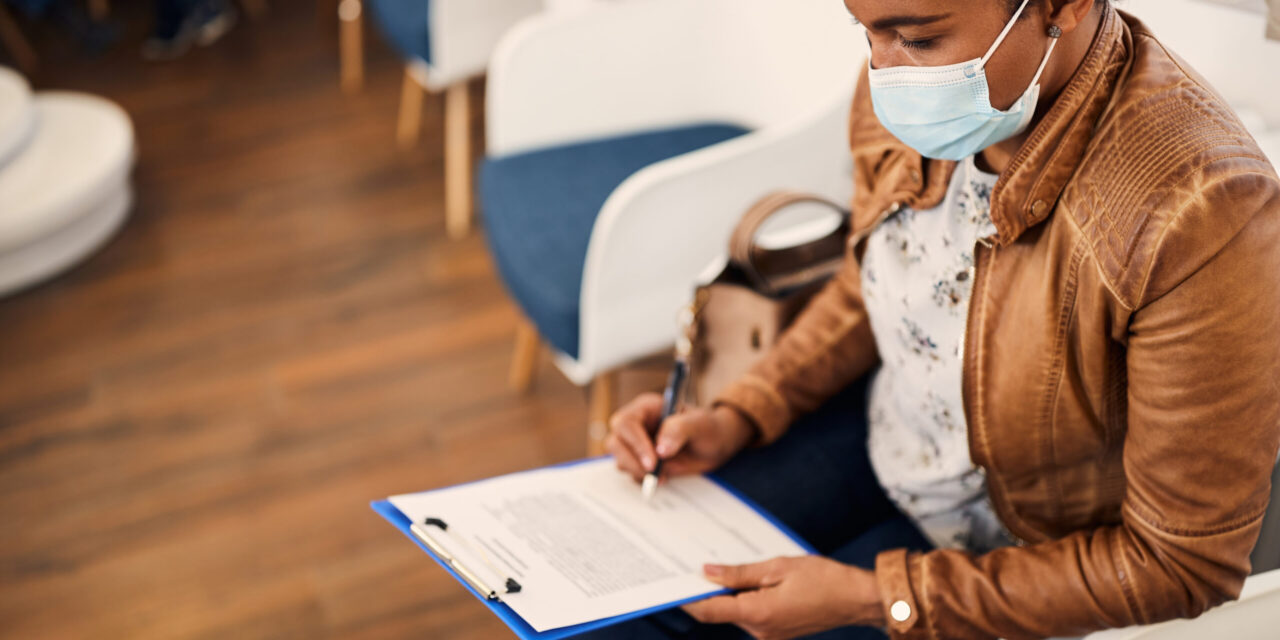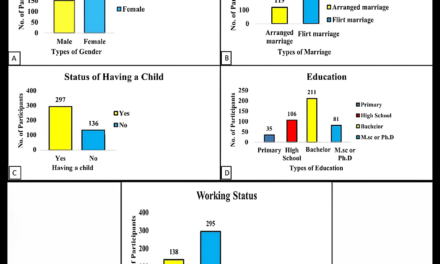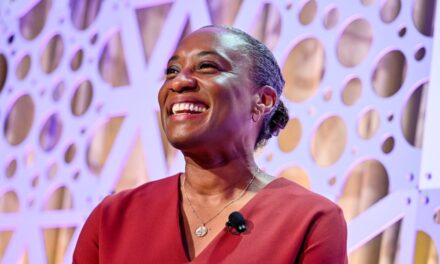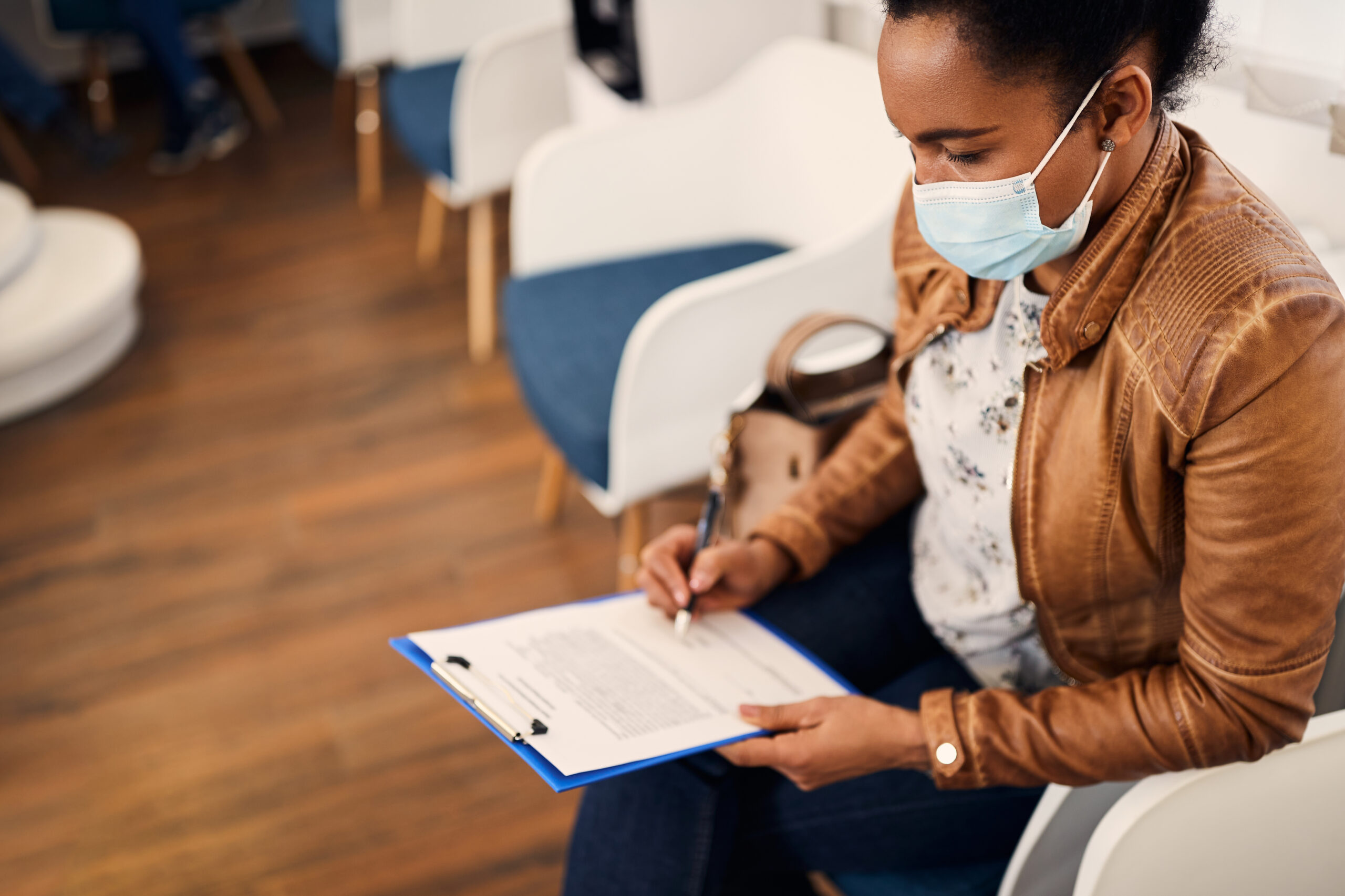
Polling that the National Women’s Law Center (NWLC) conducted with Morning Consult examines the impact of “weathering” on Black women—“a process that encompasses the physiological effects of living in marginalized communities that bear the brunt of racial, ethnic, religious, and class discrimination.”i Weathering describes how racism, poverty, and other social and economic disadvantages puts people under chronic stress that wears down their physical health. The polling reveals that Black women believe a wide range of factors, including gender and racial discrimination, income, education, employment, community, and safety, affect their health. In fact, over half of Black women surveyed agree that weathering has had an effect on their community.ii The survey also finds that a majority of Black women would like to see the government do more to address these issues.iii
Black women say that discrimination impacts health outcomes and would like to see the government do more.
- When given a definition of discrimination in the health care system,iv 75% of Black women agree that racial discrimination affects an individual’s overall health.
- When it comes to racial discrimination in health care, 56% percent of Black women overall say the government is not doing enough to address the issue.
- These numbers are higher among older Black women (64% say not doing enough) and college-educated Black women (71% say not doing enough).
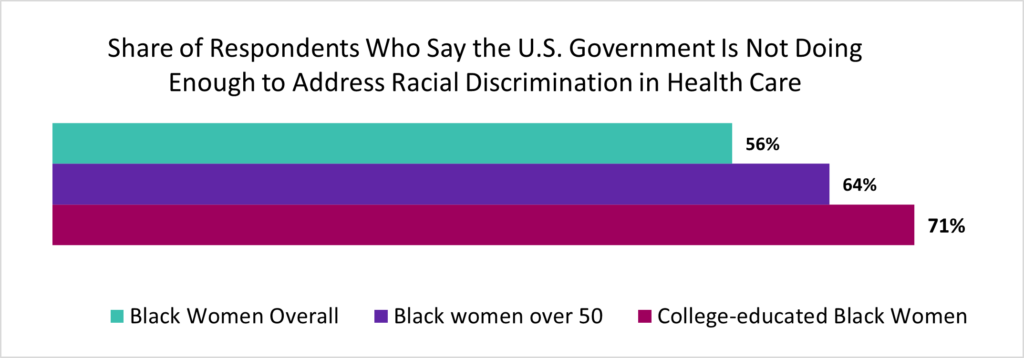 Source: Morning Consult and NWLC survey of 1498 U.S. adult women conducted December 9 to December 14, 2023.
Source: Morning Consult and NWLC survey of 1498 U.S. adult women conducted December 9 to December 14, 2023.
- A majority of Black women (62%) agree that gender discrimination affects an individual’s overall health.
- Eighty-one percent of college-educated Black women agree.
- Over half of Black women (51%) believe the government is not doing enough to address gender discrimination in health care.
- These numbers are even higher among olderv Black women (55% say not doing enough), Black women making over $50,000 annually (58% say not doing enough), and college-educated Black women (64% say not doing enough).
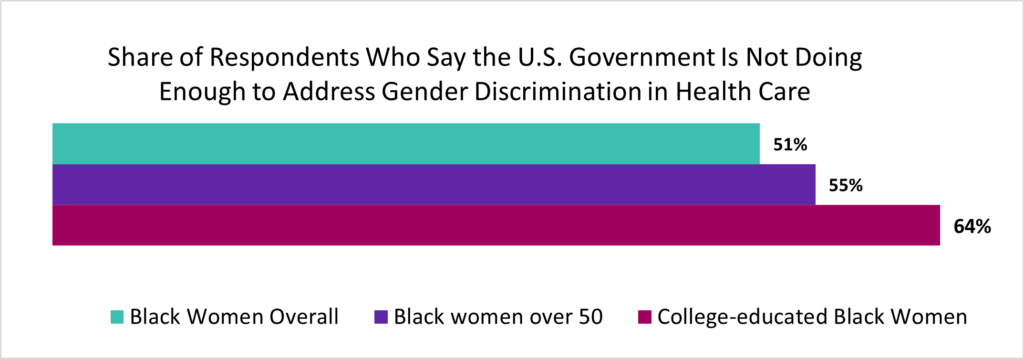 Source: Morning Consult and NWLC survey of 1498 U.S. adult women conducted December 9 to December 14, 2023.
Source: Morning Consult and NWLC survey of 1498 U.S. adult women conducted December 9 to December 14, 2023.
Black women say that mental and emotional stress impacts their health and well-being.
- Fifty-one percent of Black women say stress has an impact on their health and well-being, including 22% of Black women who say it has a major impact.
- A higher percentage of younger Black women (under 50 years old) report an impact (59%) compared to older Black women (42%).
- One third of Black women (33%) say they suffer from a chronic physical health condition.
- One in five Black women (20%) say that they suffer from a chronic physical health condition that has been made worse due to chronic mental or emotional stress.
Black women say that socioeconomic factors like housing and low wages impact their own health and the health of other Black and brown women.
- In addition to factors like stress, over two-thirds of Black women (69%) agree that socioeconomic factors, including income, education, employment, community, and safety, affect an individual’s overall health.
- For Black women, insufficient wages and cost of housing are the top stressors they identify from a listvi as contributing to their own mental and emotional health in the past six months.
- Isolation or loneliness, the cost of health care, the cost of transportation, and the availability of housing are also among the top selected stressors for Black women.
- Black women also acknowledge that racial and gender discrimination are stressors that contribute to their own mental and emotional health.
- Over two-thirds of Black women (69%) believe that the list of stressors affect the overall mental and physical health and well-being of Black and brown women.
- This includes 81% of Black women with a college education, and 79% of Black women who experienced postpartum symptoms 12+ months after childbirth.
- When participants were provided with a definition of weathering, over half of Black women (63%) agree that “weathering has had an effect on members of their community.”
- This number is even higher among Black women making over $50,000 (74% say they agree), and college-educated Black women (81% say they agree).
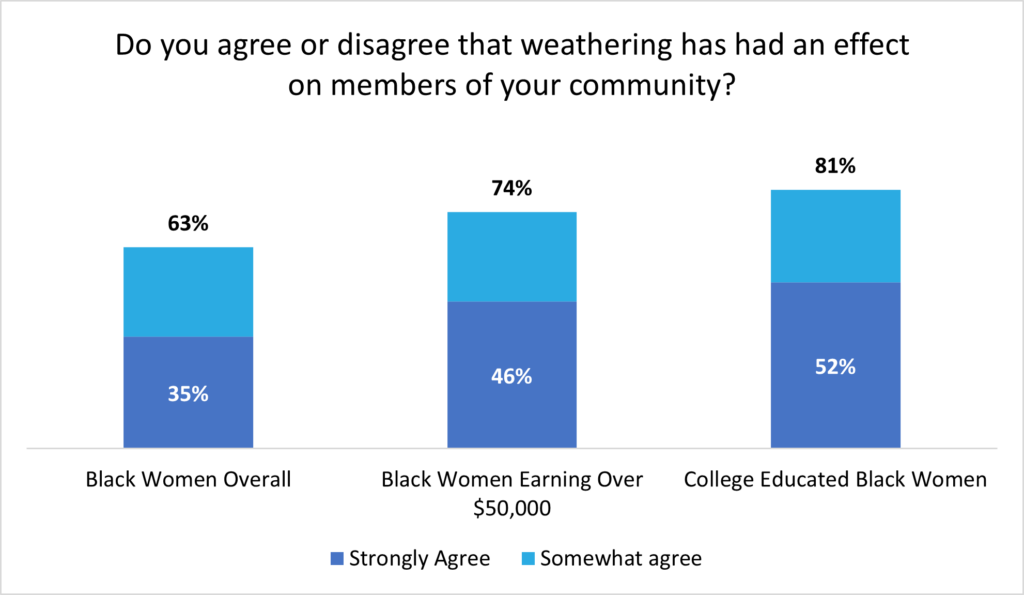 Source: Morning Consult and NWLC survey of 1498 U.S. adult women conducted December 9 to December 14, 2023.
Source: Morning Consult and NWLC survey of 1498 U.S. adult women conducted December 9 to December 14, 2023.
Black women are ready for the government to acknowledge weathering and to take it into account when considering policy measures.
- Nearly three-quarters of Black women (73%) believe that it is important for “the government to acknowledge the effects of weathering when considering new health care policies.”
- These numbers are even higher among Black women earning over $50,000 (82% say important) and college-educated Black women (90% say important).
Black women want to see the government implement policy measures to address a range of factors that contribute to weathering.
- Black women feel that passing policy measures to address all 12 of the stressors tested in the survey are important to alleviate the impact of weathering on community health.
- For Black women, top stressors that are important to address include the availability of housing (80% say important and 63% say very important), the cost of housing (79% say important, 63% say very important), and racial discrimination (79% say important and 62% say very important).
- Other top stressors include insufficient wages, the cost of health care, access to health care providers, workplace harassment and/or discrimination, and the cost of child care or other caregiving support.
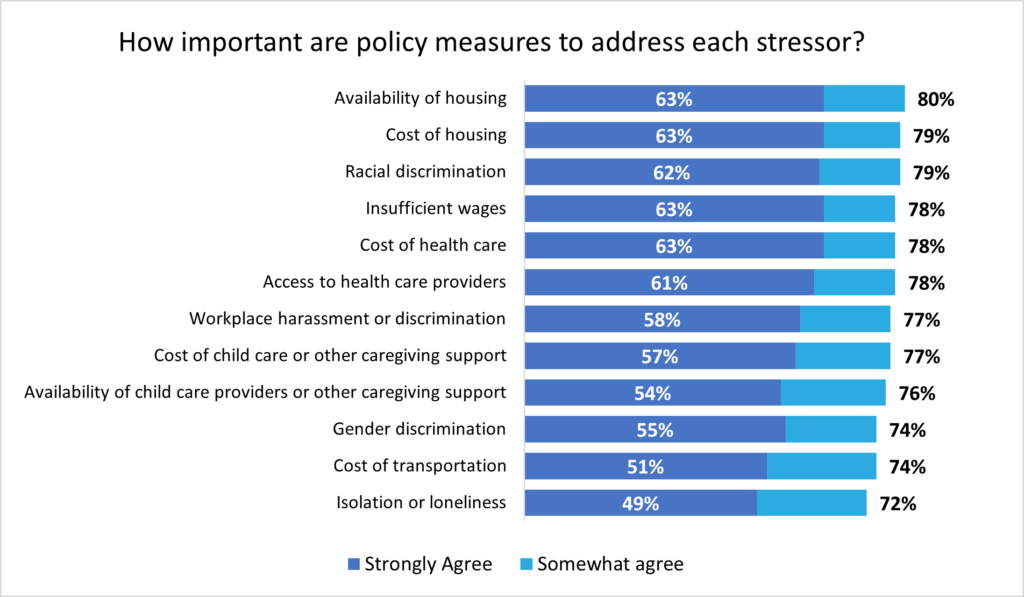 Source: Morning Consult and NWLC survey of 1498 U.S. adult women conducted December 9 to December 14, 2023.
Source: Morning Consult and NWLC survey of 1498 U.S. adult women conducted December 9 to December 14, 2023.
Black women know and experience firsthand the impacts of race and gender discrimination on their health. They agree that stressors like insufficient wages and the cost of housing impact their physical, mental, and emotional health and want the government to craft health care policies that acknowledge the effects of weathering and chronic stress on overall health and well-being, and they want the government to pass policies to elevate the stressors and issues that lead to weathering and chronic stress.
Acknowledgement
The author would like to thank Gretchen Borchelt, Marie Cole, Stephanie Hernandez, Sarah Javaid, Kamilah Kerr, Dorianne Mason, Jasmine Tucker, and Hilary Woodward for their contributions to reviewing, designing, and disseminating this fact sheet.
Read the official factsheet here.
i Geronimus, A. T. 2023. Weathering: The extraordinary stress of ordinary life in an unjust society. Little, Brown Spark
ii The definition of weathering offered to respondents was:
The term weathering refers to the notion that ongoing social and economic disadvantages (stressors) can lead to a decline in physical and mental health overtime.
iii The national poll was conducted between December 9-December 14, 2023 among a sample of 1,498 U.S. women ages 18+, including 502 White women, 497 Black women, and 499 Latina women. The interviews were conducted online and the data were weighted to approximate a target sample of U.S. women based on age, gender, race, educational attainment, region, gender by age, and race by educational attainment. Results from the full survey have a margin of error of plus or minus 4 percentage points. All results are calculated with demographic post-stratification weights applied.
iv “Discrimination” definition provided to respondents:
As you may know, discrimination in the healthcare system refers to unequal treatment in medical settings due to factors like one’s gender, race, age, sexual orientation, appearance, or ability to speak English (among other factors). This can include lack of access to certain kinds of care available to others, not being taken seriously when voicing concerns about care or treatment, or providers lacking knowledge of certain groups’ specific health needs/experiences.
v Older Black women include women who report being age 50 or above
vi List includes: cost of housing, insufficient wages, isolation or loneliness, cost of health care, cost of transportation, availability of housing, access to healthcare providers, workplace harassment or discrimination, gender discrimination, cost of childcare or other caregiving support, availability of childcare providers or other caregiving support, and racial discrimination.

